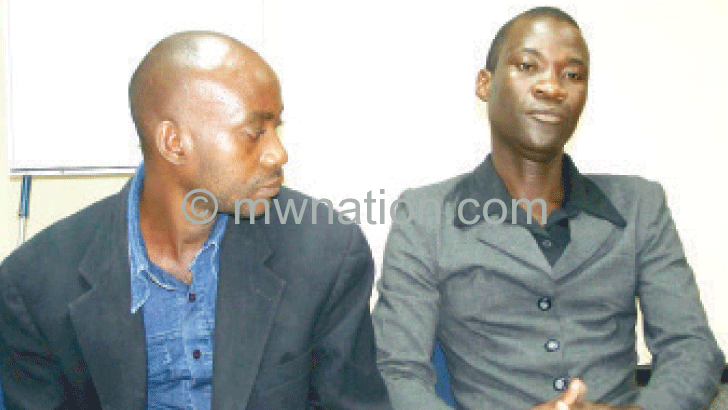Parties dodge LBGTI debate
Politicians keep sidestepping the thorny question about same-sex relationships a decade after Tionge Chimbalanga and Steven Monjeza were jailed.
The country’s laws criminalise same-sex marriages and the then president Bingu wa Mutharika pardoned the country’s first gay couple “on humanitarian grounds” after a court handed them a maximum sentence of 14 years in jail.
“These boys committed a crime against our culture, our religion and our laws,” said Bingu after pardoning them.

Monjeza and Chimbalanga made Malawians know about LGBTI issues when they engaged in 2009
However, the stance backed by religious and cultural leaders stirred protests from human rights defenders who invoke the constitutional principle of equality and non-discrimination, saying lesbian, gay, bisexual, transgender and intersex (LGBTI) people need to be treated like everyone because they have rights.
Government has issued a moratorium to protect sexual minorities, but the laws are still in the books.
With less than two months to the May 21 Elections, Polls 2019 asked some political parties how they will handle LGBTI issues after the polls.
UTM spokesperson Joseph Chidanti Malunga said his party will strive to understand why people victimise the LGBTI community.
“It is about the security of everyone,” he said. “We will need to understand these issues first and then come up with a fair solution. I am saying this because LGBTI issues have cultural and religious connections as such, there is need to be careful by striking a balance.”
Malunga, however, pointed out that violence against the LGBTI community will not solve anything as “they are our children”.
“Our aim is to ensure that we coexist. As former US President Barack Obama said, even if we do not agree with what they are doing and how they live, the LGBTIs are our brothers and sisters,” he said.
Malawi Congress Party (MCP) was non-committal. Its publicity secretary the Reverend Maurice Munthali asked for more time to consult while party secretary general Eisenhower Mkaka refused to comment.
The governing Democratic Progressive Party (DPP) which has sustained a moratorium first issued by President Peter Mutharika’s predecessor, Joyce Banda, was equally dodgy.
In 2014, Mutharika promised to conduct a referendum on sexual minorities’ rights.
His administration was widely criticised last year when Malawi Human Rights Commission held public hearings on the matter.
In an interview, DPP spokesperson Nicholas Dausi said government spokesperson Henry Mussa was the right person to comment. Later, the mouthpiece of the party seeking re-election said he is not ready to comment.
Political commentator Humphrey Mvula said he is not surprised with MCP and DPP responses because “the matter is sensitive”.
“The challenge government has is the conservative block of the society like the church. It has the power that influences politics in the country. Anyone who openly supports the LGBTI community will lose elections,” he said.
Mvula said the issue does not only concern party leaders, but also members of Parliament (MPs) and councillors.
“Even on simple issues like abortion, government fails to come out in the open to support it for fear of losing public support. It cannot be far from truth by saying that the Bible is more of the country’s laws than what the laws actually say,” said the commentator.
But a member of the LGBTI community accused some political parties of failing to come out clear and allowing minorities to suffer for fear of losing votes.
“We are also going to vote in May, so we need to know political parties that have our welfare at heart. We cannot vote for parties that are going to victimise us ,” he said.
A number of the clergy have openly spoken against the LGBTI community. But Pope Francis said: “Who am I to judge them.”





